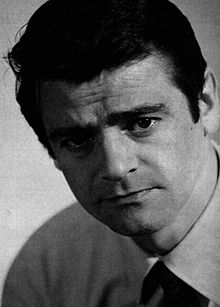Sergio Endrigo
Italian singer-songwriter (1933–2005)
You can help expand this article with text translated from the corresponding article in Italian. (February 2024) Click [show] for important translation instructions.
- Machine translation, like DeepL or Google Translate, is a useful starting point for translations, but translators must revise errors as necessary and confirm that the translation is accurate, rather than simply copy-pasting machine-translated text into the English Wikipedia.
- Do not translate text that appears unreliable or low-quality. If possible, verify the text with references provided in the foreign-language article.
- You must provide copyright attribution in the edit summary accompanying your translation by providing an interlanguage link to the source of your translation. A model attribution edit summary is
Content in this edit is translated from the existing Italian Wikipedia article at [[:it:Sergio Endrigo]]; see its history for attribution. - You may also add the template
{{Translated|it|Sergio Endrigo}}to the talk page. - For more guidance, see Wikipedia:Translation.
Sergio Endrigo | |
|---|---|
 | |
| Born | (1933-06-15)15 June 1933 Pola, Kingdom of Italy |
| Died | 7 September 2005(2005-09-07) (aged 72) Rome, Italy |
Sergio Endrigo (Italian pronunciation: [ˈsɛrdʒo enˈdriːɡo]; 15 June 1933 – 7 September 2005) was an Italian singer-songwriter.
Born in Pola, Istria in Italy (now Pula, Croatia), he has been often compared—for style and nature—to authors of the so-called "Genoa school" like Gino Paoli, Fabrizio De André, Luigi Tenco, and Bruno Lauzi.
He won the Sanremo Music Festival in 1968 with the song "Canzone per te", sung with Roberto Carlos. The same year he represented Italy at the Eurovision Song Contest 1968 with the song "Marianne." His hits also include "L'arca di Noè", "Io che amo solo te" and "Adesso sì".
Discography
Album
- 1962 – Sergio Endrigo
- 1963 – Endrigo
- 1966 – Endrigo
- 1968 – Endrigo
- 1969 – La vita, amico, è l'arte dell'incontro
- 1969 – I più grandi successi di Sergio Endrigo
- 1969 – Sergio Endrigo
- 1971 – Nuove canzoni d'amore
- 1972 – Diez Canciones De Amor
- 1972 – L'Arca
- 1974 – La voce dell'uomo
- 1974 – Ci vuole un fiore
- 1975 – Endrigo dieci anni dopo
- 1976 – Canzoni venete
- 1976 – Alle origini della mafia
- 1977 – Elisa
- 1977 – Sarebbe bello...
- 1978 – Donna mal d'Africa
- 1979 – Exclusivamente Brasil
- 1980 – A Arte de Sergio Endrigo
- 1980 – En Castellano
- 1981 – ...e noi amiamoci
- 1982 – Mari del sud
- 1982 – Se necessita una flor
- 1986 – E allora balliamo
- 1988 – Il giardino di Giovanni
- 1993 – Qualcosa di meglio
- 1996 – Il meglio
- 2003 – Altre emozioni
- 2004 – Cjantant Endrigo dut par furlan/Cantando Endrigo in lingua friulana
- 2010 – Si comincia a cantare
Singles
|
|
|
External links
- Official website: biography, discography, filmography (in Italian)
- Istria on the Internet, Prominent Istrians
| Awards and achievements | ||
|---|---|---|
| Preceded by Claudio Villa & Iva Zanicchi with "Non pensare a me" | Sanremo Music Festival Winner 1968 | Succeeded by Bobby Solo & Iva Zanicchi with "Zingara" |
| Preceded by Claudio Villa with "Non andare più lontano" | Italy in the Eurovision Song Contest 1968 | Succeeded by |
- v
- t
- e
- Al Bano and Romina Power
- Alice
- Luca Barbarossa
- Franco Battiato
- Blanco
- Gigliola Cinquetti
- Betty Curtis
- Toto Cutugno
- Nicola Di Bari
- Peppino di Capri
Diodato- Emma
- Sergio Endrigo
- Riccardo Fogli
- Francesco Gabbani
- Nunzio Gallo
- Dori Ghezzi
- Raphael Gualazzi
- Jalisse
- Fausto Leali
- Mahmood
- Måneskin
- Angelina Mango
- Mia Martini
- Matia Bazar
- Marco Mengoni
- Ermal Meta
- Francesca Michielin
- Domenico Modugno
- Gianni Morandi
- Fabrizio Moro
- Anna Oxa
- Emilio Pericoli
- Raf
- Franca Raimondi
- Massimo Ranieri
- Renato Rascel
- Ricchi e Poveri
- Enrico Ruggeri
- Bobby Solo
- Alan Sorrenti
- Tonina Torrielli
- Umberto Tozzi
- Claudio Villa
- Il Volo
- Wess
- Iva Zanicchi
- Nina Zilli
- "Addio, addio"
- "Al di là"
- "Amami se vuoi"
- "L'amore è femmina (Out of Love)"
- "L'amore è un attimo"
- "Aprite le finestre"
- "Avrei voluto"
- "Brividi"
- "Chi sarà con te"
- "Comme è ddoce 'o mare"
- "Corde della mia chitarra"
- "Dio, come ti amo"
- "Due grosse lacrime bianche"
- "Due vite"
- "Era"
- "L'essenziale"
"Fai rumore"- "Fiumi di parole"
- "Gente di mare"
- "I giorni dell'arcobaleno"
- "Grande amore"
- "Insieme: 1992"
- "Libera"
- "Madness of Love"
- "Magic Oh Magic"
- "Marianne"
- "La mia città"
- "La noia"
- "Nel blu, dipinto di blu"
- "No Degree of Separation"
- "Non andare più lontano"
- "Non ho l'età"
- "Non mi avete fatto niente"
- "Non so che darei"
- "Occhi di ragazza"
- "Occidentali's Karma"
- "Per Lucia"
- "Piove (Ciao, ciao bambina)"
- "Questo amore"
- "Raggio di luna"
- "Rapsodia"
- "Romantica"
- "Se piangi, se ridi"
- "Sì"
- "Soldi"
- "Sole d'Europa"
- "I treni di Tozeur"
- "Uno per tutte"
- "Vivo (Ti scrivo)"
- "We'll Live It All Again"
- "Zitti e buoni"
- Note: Entries scored out signify where Italy did not compete
 | This article about an Italian singer is a stub. You can help Wikipedia by expanding it. |
- v
- t
- e










